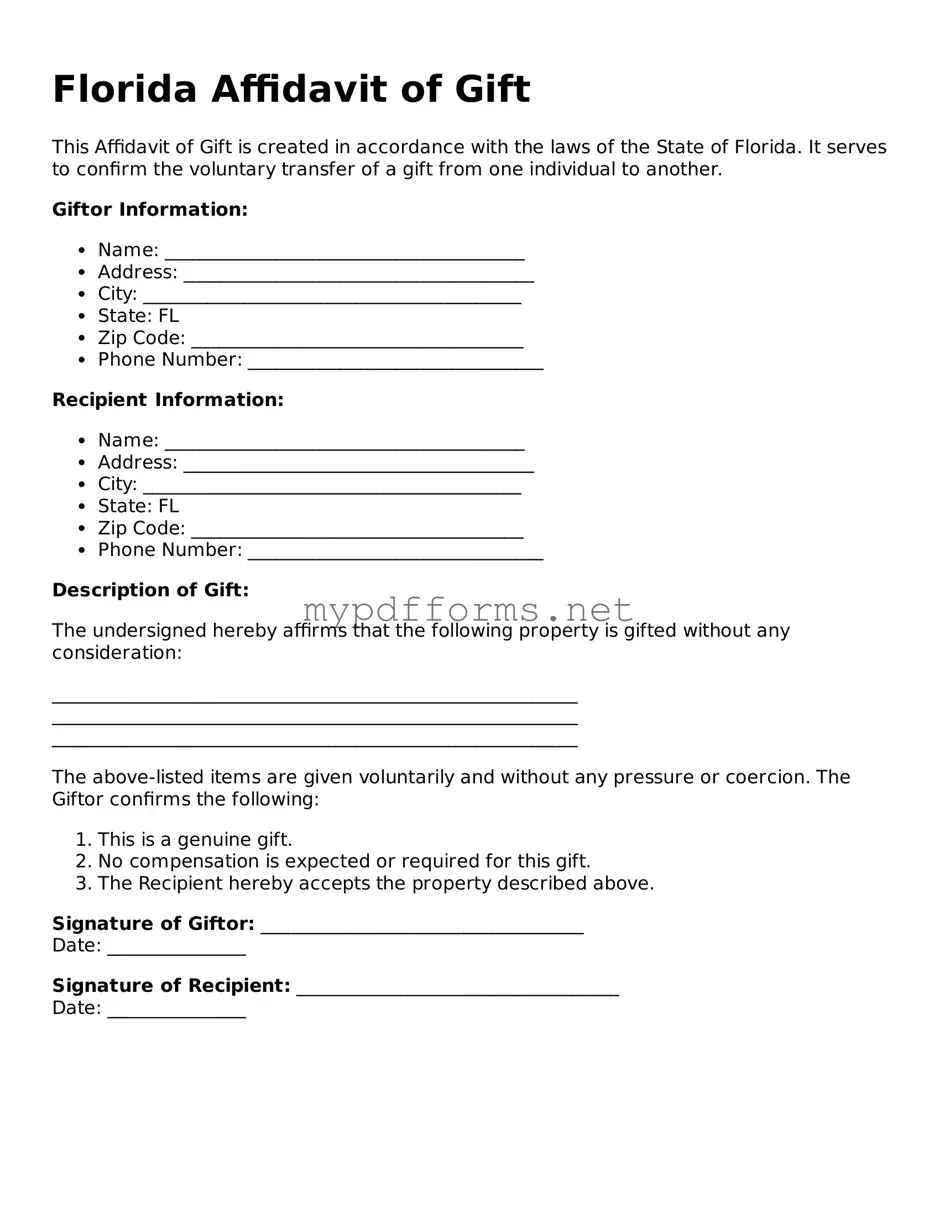The Florida Affidavit of Gift form is similar to a Bill of Sale. A Bill of Sale is a document used to transfer ownership of personal property from one person to another. Like the Affidavit of Gift, it requires the signatures of both parties involved. However, a Bill of Sale typically involves a transaction where money is exchanged, while the Affidavit of Gift is specifically for gifts without any payment involved.
Another document that resembles the Florida Affidavit of Gift is the Gift Deed. A Gift Deed transfers real property from one individual to another without any consideration. Both documents serve to establish the intent to give something as a gift. The Gift Deed, however, is more formal and often requires notarization, while the Affidavit of Gift is simpler and may not require such formalities.
The Quitclaim Deed is also similar to the Affidavit of Gift. This document transfers any interest in real estate from one party to another without guaranteeing that the title is clear. Both documents can be used to transfer property as a gift. However, a Quitclaim Deed does not require the same level of intent to give, as it can also be used in situations involving divorce or clearing up property titles.
The Affidavit of Support shares similarities with the Affidavit of Gift, particularly in its purpose of providing proof of intent. An Affidavit of Support is often used in immigration cases to show that a sponsor can financially support a relative. Both documents require a sworn statement and are used to affirm intentions, but the Affidavit of Support is focused on financial responsibility rather than the transfer of property.
The Power of Attorney (POA) document also has some similarities. A POA allows one person to act on behalf of another in legal or financial matters. Like the Affidavit of Gift, it requires clear intent and the signature of the individual granting authority. However, a POA is more about delegating authority, while the Affidavit of Gift is about transferring ownership without any conditions.
The Declaration of Trust is another document that shares some characteristics with the Affidavit of Gift. A Declaration of Trust outlines how assets are to be managed and distributed. Both documents can involve the transfer of assets, but a Declaration of Trust is more complex and often involves ongoing management of the assets, whereas the Affidavit of Gift is a one-time transfer.
Understanding the differences between various property transfer documents is crucial, especially when considering options like the Quitclaim Deed, which can be utilized to transfer ownership without guarantees about the title's validity. For those interested in preparing a Quitclaim Deed, the process can be made easier by visiting https://quitclaimdocs.com/fillable-michigan-quitclaim-deed.
The Release of Liability form is also comparable to the Affidavit of Gift. A Release of Liability is used to relinquish claims against another party, often in exchange for a gift or favor. Both documents require the signer's intent to waive rights, but the Release of Liability focuses on protecting one party from future claims, while the Affidavit of Gift focuses on the act of giving.
Finally, the Warranty Deed is similar in that it involves the transfer of real property. A Warranty Deed guarantees that the seller holds clear title to the property and has the right to sell it. Both documents are used in property transactions, but a Warranty Deed involves a guarantee of title, while the Affidavit of Gift does not involve any such assurances.

